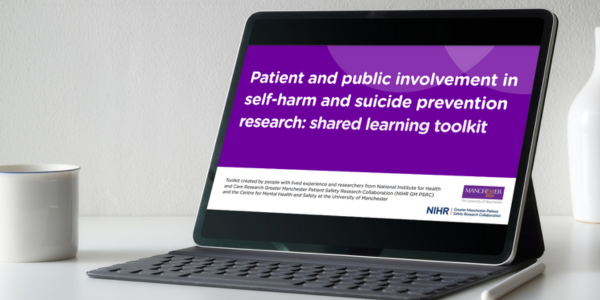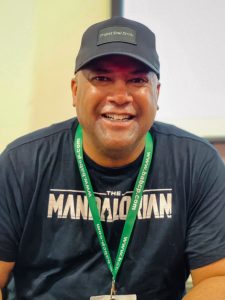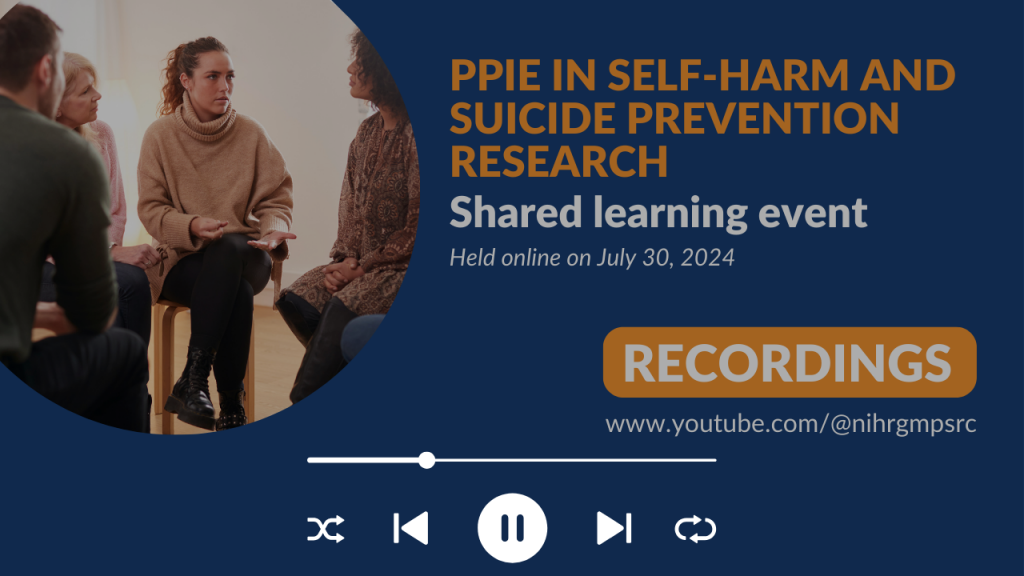
Launch of PPI Toolkits in Self-Harm and Suicide Prevention Research
On July 30th, we had the pleasure of hosting a highly insightful and collaborative online event focused on enhancing Patient and Public Involvement and Engagement (PPIE) in self-harm and suicide prevention research. The event, organised by the Centre for Mental Health and Safety at the University of Manchester and the NIHR Greater Manchester Patient Safety Research Collaboration, marked the launch of two significant resources designed to improve PPIE practices in this critical field.
What we launched:
- A Shared Learning Toolkit for Patient and Public Involvement in Self-harm and Suicide Prevention Research: This resource is geared toward organisers, researchers, and healthcare staff to better incorporate PPIE into their work.
- A Guide for Public Contributors: Specifically crafted to empower public contributors, this guide offers valuable insights and guidance on engaging with research processes in self-harm and suicide prevention.
If you’re passionate about patient involvement and engagement in mental health research, we encourage you to explore the toolkits and consider how they might benefit your work or contributions. For more information or to discuss further involvement, please reach out to Dr. Leah Quinlivan at leah.quinlivan@manchester.ac.uk.
PPIE reflections: a participant’s perspective
A Movement Beyond a Term
By Chris Frederick
On July 30th, I joined an important webinar hosted by the NIHR GM PSRC about Patient Public Involvement (PPI) in the self-harm and suicide prevention space. It got me thinking about how PPI isn’t just some buzzword we toss around. It’s about real people, real voices, and real impact. The term “PPI” doesn’t really capture the depth of what we do—it’s a movement, not just a label.
In my work, I’ve seen how vital it is to involve people with lived experience in meaningful ways. It’s not just about giving them a seat at the table but making sure they have a voice that’s heard and respected. Over the past year, I’ve participated in 36 consultations, focus groups, and speaking engagements. Each one has reinforced the importance of treating lived experience practitioners as “Trusted Advisors” or “Consultants,” not just participants. Fair compensation and proper recognition aren’t just nice-to-haves; they’re essentials.
But let’s be honest—PPI work isn’t always easy. There’s often a power imbalance that can make those with lived experience feel like their voices are less valued. That’s why it’s crucial for organisations to be transparent, provide support, and offer various ways for people to get involved. Flexibility and understanding go a long way in making sure everyone feels included.
One project close to my heart is Project Soul Stride. It started as a research initiative but has become something much bigger. Since last August, I’ve interviewed over 150 stakeholders to shine a light on the mental health services available to the Black community in London. It’s clear that we have a lot of work to do. The Black experience of suicidality is often overlooked, and we need to change that.
On a personal note, the power of sharing our stories can’t be underestimated. I’ve never seen myself as a “trailblazer,” but I’ve come to realize that speaking out, especially about the tough stuff, can lead to real change. Still, there’s a need for better networking and communication in PPI work. I dream of an online space where those of us in this field can connect, share, and support each other.
PPI is more than just involvement—it’s about creating a movement that makes a difference in people’s lives. And that’s something worth fighting for.

Chris Frederick is an expert by experience who works with charities and other organisations to support better mental health for the black community, after surviving his own breakdown. A passionate Star Wars fan, Chris proudly considers himself a ‘mental health Jedi’
Chris was one of the speakers at the launch event. You can watch his talk by clicking here.
Watch the recordings
You can watch the recordings of each session by clicking the buttons below
Talk 1 – Leah Quinlivan | Research and involvement at the Centre for Mental Health and Safety
In this introductory video, Leah Quinlivan, Research Fellow at the NIHR Greater Manchester Patient Safety Research Collaboration (GM PSRC), presents her talk from the launch event. She provides an overview of the Centre for Mental Health and Safety’s research and involvement initiatives, setting the stage for the valuable insights and discussions that follow in the rest of the series.
Talk 2 – Liz Monaghan | PPIE: a public contributor perspective
In this talk, public contributor Liz Monaghan shares her perspective as a public contributor on Patient and Public Involvement and Engagement (PPIE). Her talk offers valuable insights into the role and impact of public involvement in research, highlighting the importance of meaningful engagement from a contributor’s point of view.
Talk 3 - Jav Reheman | Cultural Competency
In this talk, public contributor Jav Reheman explores the topic of cultural competency.
Talk 4 - Chris Frederick | PPIE, Tackling Suicidality and Mental Health problems in the Black community
In this talk, public contributor Chris Frederick discusses Patient and Public Involvement and Engagement (PPIE) in the context of addressing suicidality and mental health issues within the Black community. He offers valuable insights into the unique challenges and opportunities for improving mental health support and engagement in this community.
Talk 6 - Leah Quinlivan | PPIE in Self-Harm and Suicide Prevention Research resources overview
In this talk, Leah Quinlivan, Research Fellow at the NIHR Greater Manchester Patient Safety Research Collaboration (GM PSRC), provides an overview of the PPIE resources launched to enhance self-harm and suicide prevention research.
Talk 7 - Jo Lockwood | Involving young people in research: Resources
In this talk, Joanna Lockwood, Research Fellow at the University of Nottingham shares about involving young people in research.








0 Comments